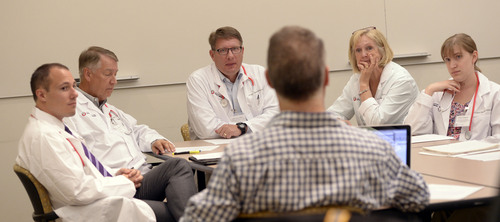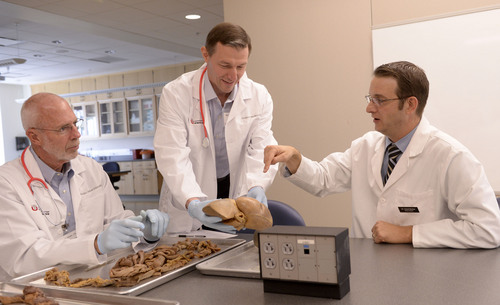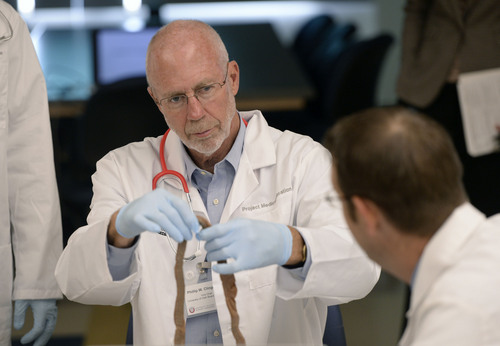This is an archived article that was published on sltrib.com in 2014, and information in the article may be outdated. It is provided only for personal research purposes and may not be reprinted.
Utah legislators and policy-makers stepped into the life of a medical student — analyzing colon specimens and making diagnoses — Thursday during the University of Utah's inaugural Project Medical Education.
During the one-day mini-medical school, participants went through a white-coat ceremony, worked through patient cases, discussed lab samples, were assigned to residency programs and learned about the daily tasks of an academic physician.
"Our mission is really to serve the state and I think it's really important for community leaders and people who represent us and make decisions about medical training and about healthcare to have a good understanding of what it's all about," said Vivian Lee, dean for the School of Medicine.
In the pathology lab, Frederic Clayton, associate professor of pathology, showed participants several photos of diseased colons, one with Crohn's disease, one with diverticulitis and another with ulcerative colitis.
"We show these on the screen and ask (students) to figure it out," Clayton said later. "They've got to learn to look at a clinical history and say 'It may be this, but it's definitely not this.' They have to learn to think like this."
Lee said Thursday's agenda for policy-makers covered just a few experiences that medical students have. "But the snippets they're getting are real, definitely real."
Rep. Mike Kennedy, R-Alpine, and Sen. John Valentine, R-Orem, co-sponsored a 2013 bill that increased the size of the U. medical class from 82 students to 122, and they donned white lab coats with red stethoscopes during Thursday's mini-medical school.
Utah ranks among the states with the fewest primary care physicians per 100,000 residents, which was one of the arguments for educating more doctors.
Kennedy said lawmakers benefit from such visits to the medical school "so that when the check is written ... we understand how it's being used."
Kennedy, a family doctor for 15 years, brought along his 13-year-old daughter, May, for the mini-medical school.
Valentine, an advanced emergency medical technician whose son is a physician, said, "This is a dream come true for me to actually see what my son experienced and see what I could have done if I'd gone into medicine instead of being a lawyer."
Valentine, a 26-year member of the Legislature, won't sponsor any more legislation to help the medical school; if the Senate approves, he will become the new head of the Utah Tax Commission.
Twitter: @DanielleKManley







